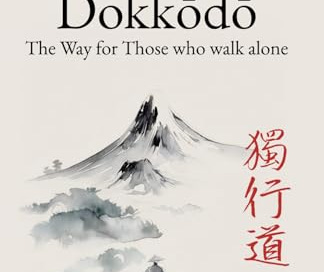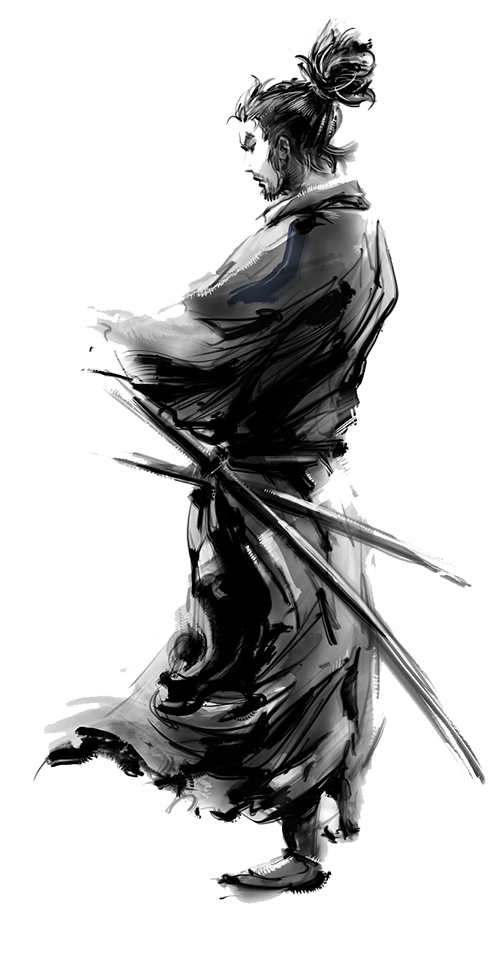"You can only fight the way you practice."
Myamoto Musashi
In 1645, legendary samurai Miyamoto Musashi wrote Dokkōdō (“The Way of Those Who Walk Alone”, or I have also seen a translation as “The Path I Walk is Mine Alone”), a list of 21 principles to guide a life of honor and discipline.
Welcome to another edition of “Students of Leadership,” where centuries later these principles visit us to help us shape our thinking in the search for high-performance.
What I’ve done today is simple, in a succinct way I present you each principle as written by Musashi, add a personal insight and a leadership challenge to help reflect on the potential implication in our daily life.
I invite you to make these principles your own, and thoughtfully choose one or two of them to help you guide your next team meeting as you continue shaping a culture of excellence around you and the ones you care.
Dokkōdō Miyamoto Mushashi’s
21 Principles
1. Accept everything just the way it is.
The hidden gem of this principle is not acceptance per se, it’s what it enables. Accepting reality as it presents, enables clear decision-making, forcing your thinking to be grounded on facts (however brutal) instead of wishful thinking. This level of pragmatism in leadership is priceless.
Challenge: Confront one uncomfortable fact you’ve been avoiding and adjust your plans to address it head-on, now!
2. Do not seek pleasure for its own sake.
Disciplined leaders anchor in deep purpose and prioritize long-term goals over fleeting pleasure, short term gains and immediate satisfaction where there is so much to build.
Challenge: Be intentional about how you spend time today, let indulgences go and purposefully invest that time into an activity that advances your highest goals. Make the clear trade-off.
3. Do not, under any circumstances, depend on a partial feeling.
Avoid half-hearted decisions. If it doesn’t feel right yet, don’t make the move, wait. Strong leaders move fast and decisively, but also insist on clarity and full commitment before moving forward.
Challenge: Identify a decision you still need to make, pursue aggressively the missing information, consider all valid perspectives, seek clarity, and commit fully to a course of action by a set date.
4. Think lightly of yourself and deeply of the world.
Keep your ego in check, be humble, use your energy to focus on two things, first the bigger picture and the broader context of things; second the people, their perspectives, motivations and needs.
Challenge: Seek to go deep in your understanding of the context of any given situation and solicit a colleague’s perspective on an important issue. Practice deep listening, absorb their insights, ask clarifying questions, let them give you all they’ve got without immediately imposing your own viewpoint. Practice finishing the conversation without you having said what you think and commit to reflect on what they have said.
5. Be detached from desire your whole life long.
Mission-focused leaders don’t let personal desires skew their judgment or priorities.
Challenge: Notice if a personal desire is influencing a decision; then deliberately set it aside and choose what best serves your long term goals. Practice awareness.
6. Do not regret what you have done.
Avoid looking back in remorse. Look back in reflection. Effective leadership requires rapid learning from mistakes, not letting regret drain your energy and confuse your path forward..
Challenge: Take the time to reflect on a recent misstep, something you may have not yet turned into a real lesson, capture the teachings, and then move on decisively.
7. Never be jealous.
Envy is misplaced and wasted energy. Celebrate others’ successes and stay focused on your own path.
Challenge: Reflect on a peer’s success, make sure you congratulate them and bring the insight or lesson to your own team to educate on it and celebrate the success of a colleague.
8. Never let yourself be saddened by a separation.
Transitions are natural, every departure makes room for new growth. Let go gracefully and move forward.
Challenge: If a valued team members leaves, thank sincerely for the contributions, wish them well and immediately channel your energy into the opportunities it creates (e.g. redistributing responsibilities while you hire new talent).
9. Resentment and complaint are appropriate neither for oneself nor others.
Grudges and whining poison morale. Be a role mode of leadership and accountability over victimhood and drama. Don’t blame or resent. Either solve the problem or let it go.
Challenge: The next time you catch yourself about to complain, moving from accountability to drama, pause and reframe: either take one concrete action to improve the situation or release it if it’s beyond your control. Don’t feed the wrong energy.
10. Do not let yourself be guided by the feeling of lust or love.
Stay professional and objective, don’t let personal preferences, friendship, favoritism, or attachments cloud your judgment in leadership decisions. Others will notice and culture will become toxic.
Challenge: Have the courage to audit recent decisions and search for personal bias: ensure you’re not favoring an idea or a person because you like them. Re-anchor your choice in clear, objective criteria.
11. In all things have no preferences.
Leaders with no rigid personal preferences can adapt and choose the best course based on reality, free from bias.
Challenge: In your next meeting, fully consider an idea you wouldn’t normally choose, evaluating it on its merits even if you think it is not the right one. Stretch yourself
12. Be indifferent to where you live.
Reflect on how you remain effective and how your values stay constant no matter the environment or circumstances you are in.
Challenge: Change up your routine one day, work from a different spot or without your usual comfort, or in a different context to prove that your focus and leadership presence remain just as strong.
13. Do not pursue the taste of good food.
Maintain self-discipline and don’t let comfort (the metaphor of “taste of good food”) distract you from what truly fuels your performance.
Challenge: Skip a time-consuming indulgence and use the saved time or energy into something that strengthens your leadership.
14. Do not hold on to possessions you no longer need.
Eliminate clutter, simplify. Review outdated strategies or excess activities that brings productivity down. Shed what no longer adds value, stay focused and agile.
Challenge: Identify one thing you’re holding onto that has outlived its purpose (a project that doesn’t really take off, an old bureaucratic report that adds not value, or even a simple office item) and eliminate or delegate, lighten your load.
15. Do not act following customary beliefs.
Innovation over convention. Think for yourself, challenge assumptions, do what’s right, not just what has been done.
Challenge: Identify one “we’ve always done it this way” practice and question it. Initiating a discussion on how to do it better, do it faster or not do it at all.
16. Do not collect weapons or practice with weapons beyond what is useful.
Basic tools well sharpened beat a fancy arsenal. Choose a few powerful systems and skills, and master them, be exceptional. Do not dilute your focus.
Challenge: Review your subscriptions, apps, tools and projects. Identify one that adds little value or is never used. Cut it and double down on one of the core tools or skills you need.
17. Do not fear death.
Don’t fear failure or the need to restart. Risk and failure are the price of ambition. Don’t let the fear or loss or making mistakes paralyze your strategic moves.
Challenge: Take a courageous step on something you’ve been avoiding: an ambitious idea or delivering tough feedback, act and see it through.
18. Do not seek to possess either goods or fiefs for your old age.
Don’t lead with a hoarder’s mindset, accumulating for its own sake. Focus on creating value and legacy now. A life of contribution yields peace in the future.
Challenge: Examine a cautious decision you’ve been making solely for future comfort and pivot toward a choice that favors growth or learning now. Don’t play it safe for the future, it may end up being more costly than you think not acting today.
19. Respect Buddha and the gods without counting on their help.
Be loyal to your values, honor your guiding principles, don’t take your mentors for granted. Do all that never expecting anything in return, do it because it’s right.
Challenge: Identify one issue where you’ve been waiting for someone else’s intervention. Take a direct action today to address it.
20. You may abandon your own body but you must preserve your honor.
Integrity is non-negotiable. Your reputation for honor is your most enduring asset. If pressured to cut corners or compromise your values, always hold the line.
Challenge: This week make one (however small) decision solely because it’s the right thing to do, even if it costs you time, money, or convenience in the short term.
21. Never stray from the Way.
Consistency of purpose: never abandon your core values or strategic vision, even under high pressure.
Challenge: There is no specific challenge here. The whole is the challenge: never abandon your values!
Conclusion
Musashi’s timeless principles offer a blueprint of continuous self-mastery because he was not just a philosopher but also a swordsman. His thinking and action were in sync, were one.
Commit to the principles and stay true to the path you walk.
You will naturally lead with discipline, clarity, and honor in even the most complex of times.
P.S. Before I go, here you have “The Treat,” where I share some of the music that kept me company while writing … Enjoy as you bid farewell to this post
“Lead yourself, Learn to live. Lead others, Learn to Build.”
If you enjoyed reading this post consider subscribing to the newsletter for free, joining the community and sharing your thoughts.







Brilliant